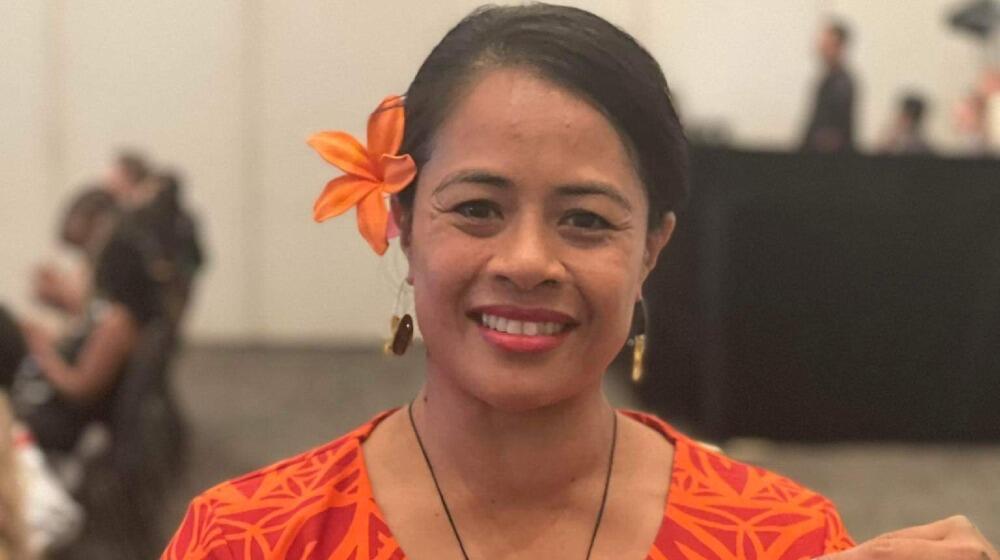CANCUN, Mexico. “I am extremely proud that Samoa has won this award! ‘Leaving No One Behind’ has been the driving force behind the Spotlight Initiative to ensure that young people are included and are at the center of all development programmes in Samoa, so as to prevent violence against women,” Ms. Gabrielle Apelu exclaimed in joy. Ms. Apelu, a member of the Civil Society National Reference Group and Comprehensive Sexuality Education Trainer for the Sports Sector in Samoa, was one of the delegates from Samoa who heard the announcement on 17 September,2022 during the Global Learning Symposium of the Spotlight Initiative to End Violence against Women and Girls that took place in Cancun, Mexico - travelling more than 10,000 kilometers away from home – that the Spotlight programme in Samoa that she is part of implementing, won the “Global Leave No One Behind Spotlight Initiative Award”.
Other contenders for the Award included Honduras, Liberia, Tajikistan, and Zimbabwe. The Award was granted to Samoa in recognition of the country’s commitment to the principle of Agenda 2030 including the SDGs, which requires all development efforts to prioritize the most vulnerable and marginalized members of society, including women and girls, by reaching the furthest behind first and leaving no one behind. "Under the leadership of the government, the Spotlight programme in Samoa has actively engaged Civil Society Organizations to reach women, girls and young people in remote and hard-to-reach areas, with life-saving sexual and reproductive health services and gender-based violence prevention and response interventions,” said Ms. Edith Akiror, Acting Chief of Gender and the Spotlight Programme Coordinator of the United Nations Population Fund (UNFPA) Pacific, as she witnessed the Samoan programme winning the global award as part of the delegation.
The Spotlight Initiative is a global European Union - United Nations programme aimed at eliminating all forms of violence against women and girls, implemented in 26 country programmes around the world. Samoa is among the eight Pacific Island Countries that have been benefiting from this Initiative, along with Fiji, Kiribati, Republic of Marshall Islands, Federated States of Micronesia, Solomon Islands, Tonga, and Vanuatu. The Spotlight Initiative in Samoa was launched in March 2020, implemented by five Recipient United Nations Organizations (RUNOs) including UNDP, UNESCO, UNICEF and UN Women in addition to UNFPA. The UN Resident Coordinator’s Office in Apia oversees the implementation of the programme.
UNFPA Pacific, through this Spotlight Initiative, has been supporting these Pacific countries’ national governments and CSOs to implement Comprehensive Sexuality Education (CSE) in schools and out of schools. CSE enables adolescents and young people to acquire the knowledge and life skills they require to make informed decisions about their sexual reproductive health, protect themselves against unwanted pregnancies, HIV and other sexually transmitted infections, as well as gender based violence. Through the in-school CSE programme, over 50,000 young people have been reached, and a roll-out of the out-of-school CSE down to the provincial level is also underway, with support of UNFPA and the International Planned Parenthood Federation (IPPF).
In addition, UNFPA has been supporting these Pacific governments participating in the Spotlight Initiative to further develop their capacities of the Reproductive, Maternal, Newborn, Child and Adolescent Health (RMNCAH) healthcare workers, to better respond to and manage GBV, including care of the survivors of sexual violence. The new Sexual Violence Standard Operating Procedures, developed by the Ministries of Health, have been consolidated, across life-saving health and psychosocial care, and judicial/police services. UNFPA Pacific, through the Spotlight Initiative, in partnership with the University of Melbourne of Australia, has also assisted these countries with the development of common standards for the Pacific region, and trained over 200 technical staff from national statistical offices and CSOs on how to conduct safe and ethical prevalence violence surveys.


